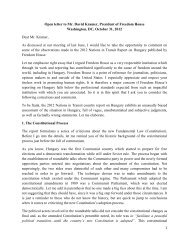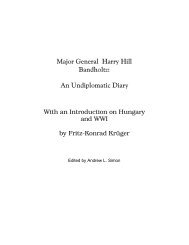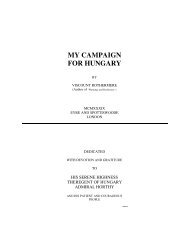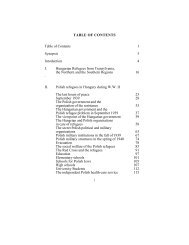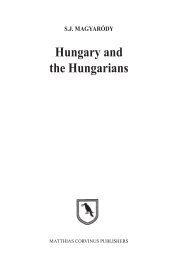The Fate of Western Hungary 1918-1921 - Corvinus Library ...
The Fate of Western Hungary 1918-1921 - Corvinus Library ...
The Fate of Western Hungary 1918-1921 - Corvinus Library ...
Create successful ePaper yourself
Turn your PDF publications into a flip-book with our unique Google optimized e-Paper software.
the voting stations, while attempting to prevent Austrian-friendly persons from<br />
reaching the ballot boxes. 502 <strong>The</strong> veracity <strong>of</strong> his assertions can be realistically<br />
questioned since, on the day <strong>of</strong> the voting, Miltschinsky was not in the city; the<br />
Austrian government, as noted earlier, had ordered its scrutineers home from<br />
Sopron two days earlier.<br />
With regard to the previous assertions, we must add: “Those <strong>of</strong> the “great<br />
fraud” opinion forget to mention that an international committee, comprised <strong>of</strong><br />
British, French and Italians, worked out the rules and organization <strong>of</strong> the<br />
plebiscite. It was accepted by both Austria and <strong>Hungary</strong> prior to the voting. <strong>The</strong><br />
international committee reviewed every question and report, making necessary<br />
corrections. During the plebiscite, international troops occupied and supervised<br />
the area. Both sides were able to propagandize in a controlled manner. <strong>The</strong><br />
international committee expelled from the area Austrian propagandists in the<br />
last days before the referendum for impermissible, harsh propaganda. Austria<br />
only began to debate the previously accepted rules when the expected plebiscite<br />
results began to take shape against their expectation. (…) <strong>The</strong> decisive factor in<br />
the plebiscite was that, amidst the crises <strong>of</strong> the day, the Austrian population was<br />
faced with an uncertain future at the time, while <strong>Hungary</strong>’s change in<br />
government direction took place earlier, liberalization had begun and with it<br />
economic growth. (…) <strong>The</strong> population <strong>of</strong> annexed <strong>Western</strong> <strong>Hungary</strong> did not<br />
wish to live in an independent province. Due to the Austrian situation <strong>of</strong><br />
political and economic crisis, a portion <strong>of</strong> them wanted union with Lower<br />
Austria or Styria, while another portion wanted to return to <strong>Hungary</strong>.” 503<br />
<strong>The</strong> withdrawal <strong>of</strong> Austria from the plebiscite process “could not have<br />
altered the outcome at the last minute, since there was no presence <strong>of</strong><br />
Hungarian power in the territory and order was entirely upheld by the units <strong>of</strong><br />
the Entente (…) in all likelihood, a greater significance can be attached to the<br />
fact that the German-speaking or German–origin population <strong>of</strong> Sopron had no<br />
intrinsic ties to Austria. As with most city dwellers today, strong linguistic and<br />
cultural assimilation was the norm. <strong>The</strong> villages surrounding Sopron had<br />
sizable Hungarian blocs, also, partly, it was not in their interest to be separated<br />
from the city with which they were affiliated. (…) <strong>The</strong> foreign observers saw<br />
that, during the days <strong>of</strong> the referendum, total calm prevailed in Sopron and the<br />
surrounding villages. No disturbances took place and the Entente generals acted<br />
with complete meticulous strictness and impartiality. We can assume that their<br />
instructions did not transgress the bounds <strong>of</strong> objective practices and their<br />
reports bear evidence that, deep in their hearts, they all felt certain sympathy for<br />
the Hungarians in this difficult question. By then, they were very cognizant <strong>of</strong><br />
the difficult circumstances that the Peace Treaty had dealt to the country. <strong>The</strong>y<br />
were also aware that the former world war ‘accomplice,’ Austria, still received<br />
502 Miltschinsky, 1922, op. cit., pp. 97–100.<br />
503 Szeberényi, András: Előszó [Prologue]. In: Zsiga, Tibor: Burgenland, vagy Nyugat-<br />
Magyarország? [Burgenland or <strong>Western</strong> <strong>Hungary</strong>] Published by: Burgenlandi Magyar<br />
Kultúregyesület, Oberwart / Felsőőr, 1991, p. 5.<br />
195




